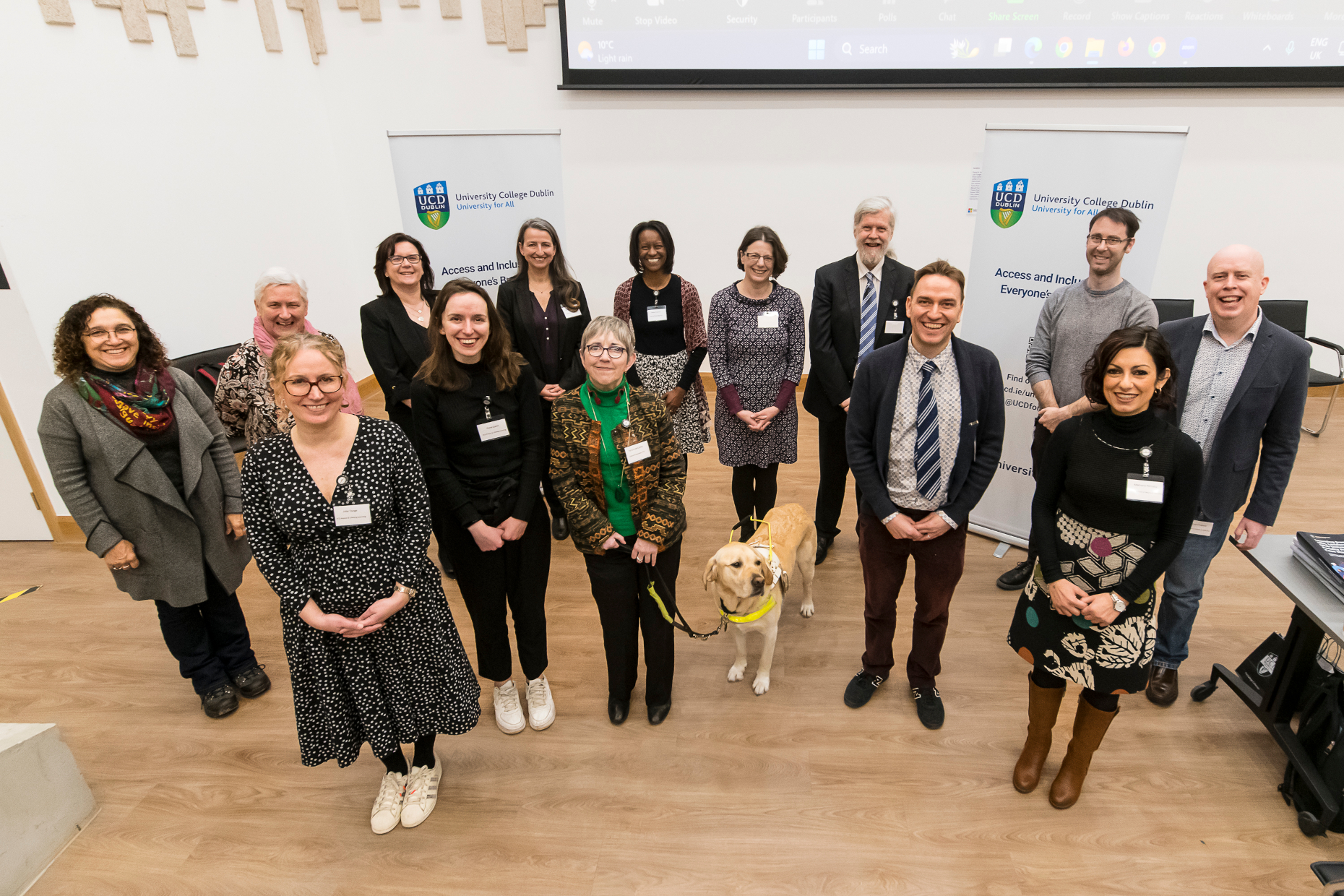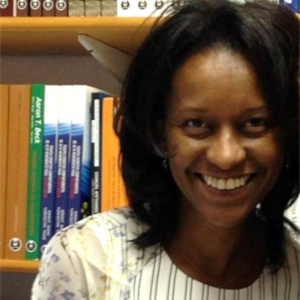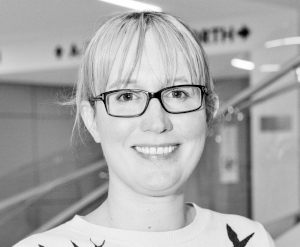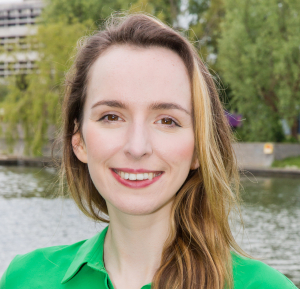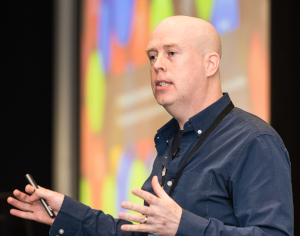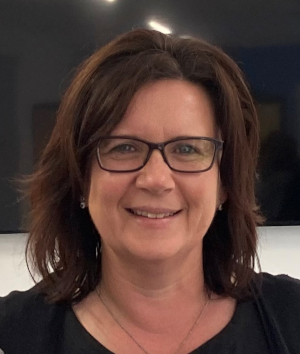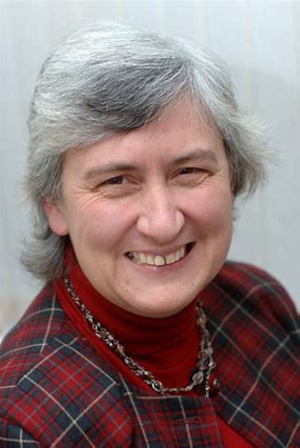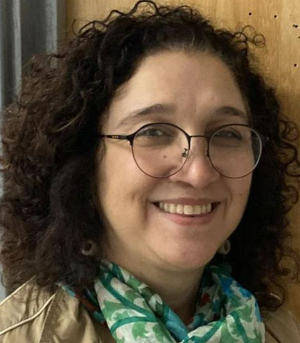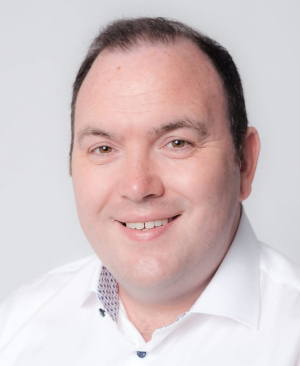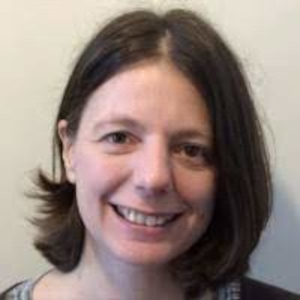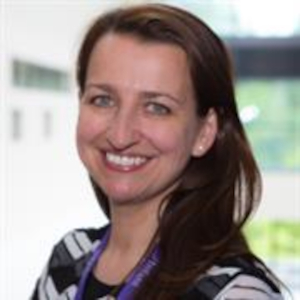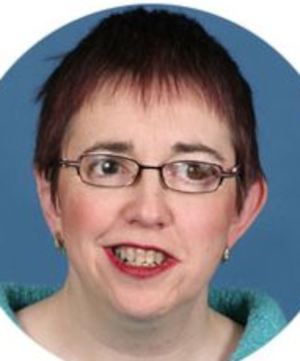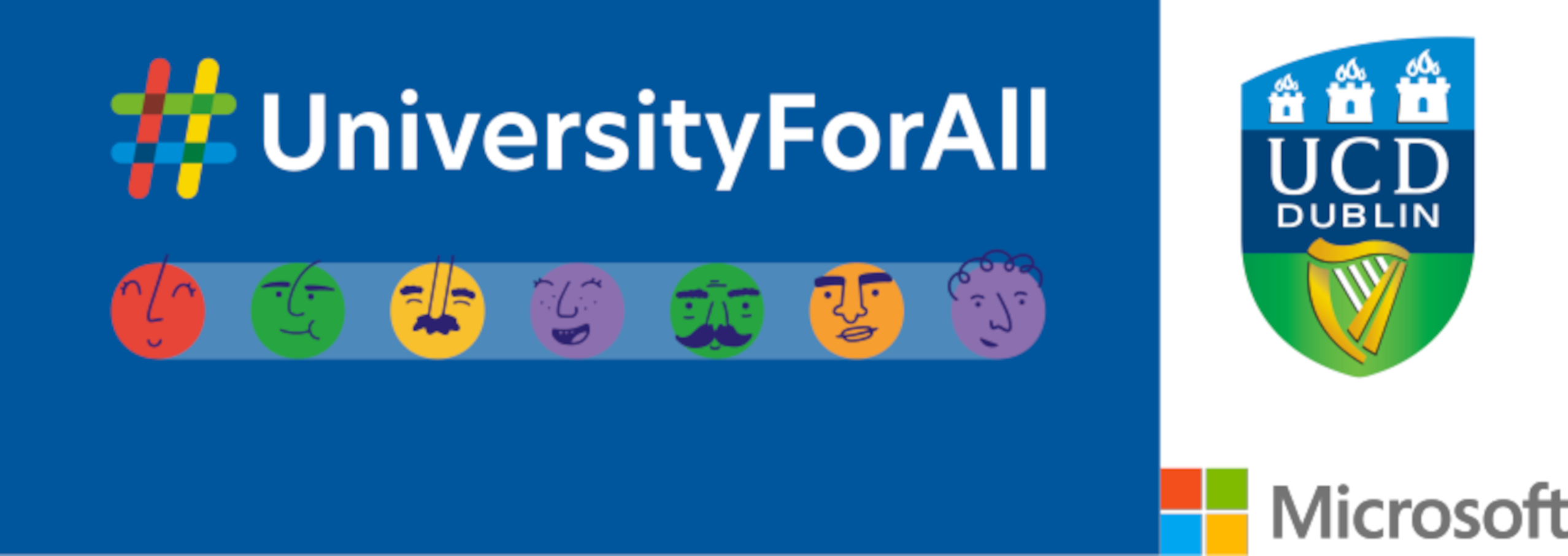
| This event showcased the latest evidence-based developments in Mathematics Accessibility in Higher Education including the themes of Digital Accessibility using LaTeX, Addressing Mathematics Anxiety, Mathematical Resilience, The efficacy of text-to-speech technology in reducing barriers to inclusive reading for mathematics students in higher education. |
|
|---|---|
|
Speakers and Organisers |
|
| Title: Unveiling the role of maths anxiety on the interplay between beliefs and attitudes towards math and career choice. |
|
|
(opens in a new window)Dr. Flavia H. Santos UCD Psychology |
Abstract: Highly maths-anxious students are more prone to avoid maths-related courses and activities. Consequently, maths anxiety might steer away students from pursuing careers in STEM. We delved into how maths anxiety affected individuals’ prospects of choosing a career in STEM, their attitudes towards maths, and their perceived maths abilities in a sample of English-speaking undergraduate students. First, maths self-efficacy was the sole significant predictor of career choice. Second, maths anxiety did not predict undergraduates’ probability of taking a STEM course while controlling for the effects of maths fluency, maths self-efficacy, trait anxiety, and gender. Yet, maths anxiety did predict participants' attitudes towards maths and their perceived maths abilities. Then, maths anxiety might play an indirect role linking beliefs and attitudes towards math and career choice. Interventions targeting math self-efficacy may promote students' entry into STEM courses. |
|
|
|
| Title: Tips for making teaching environments more accessible for neurodiverse students. |
|
|
Julie Tonge UCD Access and Lifelong Learning
Fiona Quinn UCD Access and Lifelong Learning |
Abstract: UCD Access & Lifelong Learning provides pre- and post-entry supports for underrepresented students, including students with disabilities and those with neurodiverse conditions. In this talk we will highlight the increase in students seeking support for neurodiverse conditions, the challenges some of these students experience while undertaking their programmes, and provide tips for educators on making their teaching environments more accessible for neurodiverse students. |
|
|
|
| Title: Efficacy of text-to-speech technology in reducing barriers to inclusive reading in higher education. |
|
|
Cathal O'Connor Microsoft Ireland and UCD |
Abstract: Text to speech (TTS) and read aloud tools are widely used in higher education to provide support for students with reading difficulties such as dyslexia. The development of neural TTS systems based on deep learning and artificial intelligence (AI) has significantly improved the quality of synthesised speech in the last three years, however, challenges remain. This talk will examine the latest research in speech, language, and AI, and discuss how future research can help reduce barriers to inclusive learning for students with dyslexia. |
|
|
|
| Title: Mathematics Anxiety in the Higher Education (HE) context – A Focus on Students of Service Mathematics. |
|
|
(opens in a new window)Dr Maria Ryan Mary Immaculate College, Thurles |
Abstract: Proficiency in mathematical skills among suitably qualified employees impacts positively on the effects of a changing labour market, globalisation, and technological advances. Consequently, mathematics features within many undergraduate programmes as mandatory ‘service mathematics’ modules, and this may lead to mathematics anxiety (MA) among students. An understanding of MA in general and its triggers in a HE context specifically can help heighten awareness among practitioners of the issues students face, as well as helping to facilitate suitable supports for mathematics anxious students. This presentation will explore MA within the HE context, with particular focus on its impact on students of service mathematics and the role of mathematics support. |
|
|
|
| Title: Mathematical Resilience Framework. |
|
|
(opens in a new window)Assoc. Prof. Sue Johnston-Wilder University of Warwick |
Abstract: Over the past seventy years, mathematics anxiety (MA) has been investigated by psychologists. Recommendations have been made for action and policy, which have been largely ignored to date. As a result, roughly one person in three is debilitated in mathematics. Anyone who has become aware of the consequences of Maths Anxiety on lives and well-being will join an FE teacher at a recent conference in saying "something must be done". In this talk, I review some interventions that have been tried, propose a three-level model for practitioners, and offer a Mathematical Resilience framework that has been found to be accessible to teachers, parents, support staff and learners. |
|
|
|
| Title: Addressing Mathematics Anxiety in a High School in Brazil. |
|
|
Dr Telma Para FAETEC-RJ/Technical School Support Foundation, Brazil |
Abstract: Mathematics Anxiety is debilitating and causes negative impacts on students’ academic lives. We present the results of an intervention using Participatory Action Research methodology to address Mathematics Anxiety in a public high school in Rio de Janeiro (Brazil). Tools such as the Growth Zone Model and the hand model of the brain were used in order to address anxiety and build Mathematical Resilience. The levels of Mathematics Anxiety were measured before and after the intervention using the revised MAS scale (MAS-R), and narrative records were made. Note: This is joint work with Sue Johnston-Wilder, Education Studies Department, University of Warwick. |
|
|
|
| Title: Preliminary results from a Neurodiversity survey of UCD students. |
|
|
(opens in a new window)Dr Blánaid Gavin UCD
(opens in a new window)Dr Timmy Frawley UCD |
Abstract: Neurodiversity represents a paradigm shift in the understanding of human neurodevelopmental differences such as Autism Spectrum Disorder (ASD), Attention Deficit Hyperactivity Disorder (ADHD) and Developmental Language Disorder (DLD). Available data starkly demonstrates that neurodivergent university students have suboptimal educational experiences and outcomes. Similarly, neurodivergent staff in universities experience particular difficulties that are unaddressed. The growing understanding of neurodiversity together with the acknowledged lack of equality in existing educational structures has inspired leading global universities to develop a neurodiversity friendly university model wherein neurodiversity is embraced. As a first step towards creating a Neurodiversity Friendly UCD, the Neurodiversity working group has embarked on a research programme to capture experiences of neurodiversity across the UCD community. This presentation will present preliminary data from the survey and qualitative interviews. |
|
|
|
| Title: Getting started with accessible maths. |
|
|
(opens in a new window)Dr Emma Cliffe University of Bath |
Abstract: This talk will provide a getting started guide for those new to the creation of accessible, by design, mathematical learning materials. Informed by the work of the sigma Network Accessibility Special Interest Group and members of the JISC Accessibility Community maths working group, it will give an introduction to some key questions: Why worry about maths accessibility? What problems need to be solved? How do I get started? Attendees will see clear, practical steps they can take using widely available tools and be provided with sources of further information and support. |
|
|
|
| Title: Building accessible, enriched learning materials with Chirun. |
|
|
(opens in a new window)Dr Chris Graham University of Newcastle |
Abstract: This talk will consider the development and delivery of a module in mathematical programming, which utilises the Chriun software to prepare learning material. Chirun is an open-source tool, developed at Newcastle University and used at other institutions around the UK. It produces flexible and accessible course notes, in a variety of formats, from LaTeX or Markdown source and is aimed primarily at notes in the mathematical sciences. Originally developed to accommodate a web-based alternative to traditional formats for mathematical lecture notes, the output allows students to personalise their learning material and the same source material to generate different output formats. The web-based format enriches content, allowing, for example, code to be run directly in the page, without the need for programming software, and the embedding of web-based programming exercises, which allow students to receive feedback on their progress directly inside practical handouts. |
|
|
|
| Title: Sense of Belonging of Undergraduate Students in the College of Science Correlates with Confidence in Mathematical Ability. |
|
|
(opens in a new window)Assoc. Prof. Catherine Mooney UCD |
Abstract: Sense of belonging, or belongingness, is an important factor in a student’s academic life as it is associated with factors such as motivation and persistence, in addition to mental health and well-being. Belongingness has been shown to be correlated with factors such as gender, race, nationality, socio-economic status, religion and disability. We utilised a survey adapted from the validated “Math Sense of Belonging Scale” to examine the belongingness of undergraduate science students across the UCD College of Science. In this study, we found that belongingness is not statistically significantly different across genders overall. However, minoritised students have statistically significantly lower belongingness, which varies by gender. We also found that belongingness varies across science disciplines by gender and minoritisation, and that it correlates with confidence in mathematical ability and access route into UCD. Our results provide insight that may help us as well as others improve the belongingness of undergraduate science students, with a particular focus on the intersection of identities. We will explore the impact of interventions to increase belongingness in future work. |
|
|
|
| Title: Joining the dots: Vision impairment and access to the mathematics curriculum. |
|
| (opens in a new window)Dr Patricia McCarthy TCD |
Abstract: A social model of disability perspective identifies the need to reduce the systemic barriers that obstruct disabled young people from attaining access to the same academic benefits as all young people. An area of education where blind/vision impaired people experience significant access challenges is the mathematics curriculum. The presentation of mathematics is generally visual, two-dimensional, and nonlinear in format which can result in access difficulties for vision impaired/blind people. Graphical-spatial mathematical areas including tables and graphs can prove particularly problematic for those with severe vision impairment as braille is not always adequate for mathematics notation. Blind people experience particular difficulties when accessing the mathematics curriculum due in part to the confusion with braille mathematics notation that can be experienced by those who are unable to access the mathematics curriculum through the medium of braille. This is exacerbated by the fact that few mathematics teachers know braille mathematics notation. Furthermore, while speech synthesisers are beneficial when using word processing packages, they are not always as effective when it comes to mathematics notation. The introduction of Project Maths compounded the challenges blind/vision impaired people experience when accessing the mathematics curriculum because of the increased emphasis on visual depiction. The challenges experienced when engaging with the mathematics curriculum have particular significance as mathematics is often considered essential for entry to third level education. Consequently, the teaching and learning methodologies used when working with blind/vision impaired young people need particular attention to ensure that this cohort of the student population have the same opportunities afforded to them as their non-disabled peers. |
|
|
|
